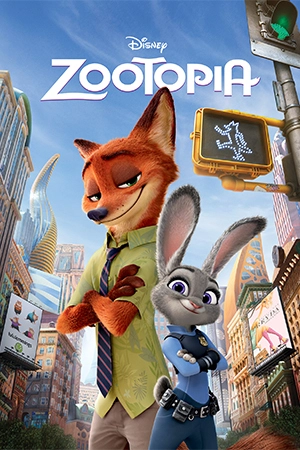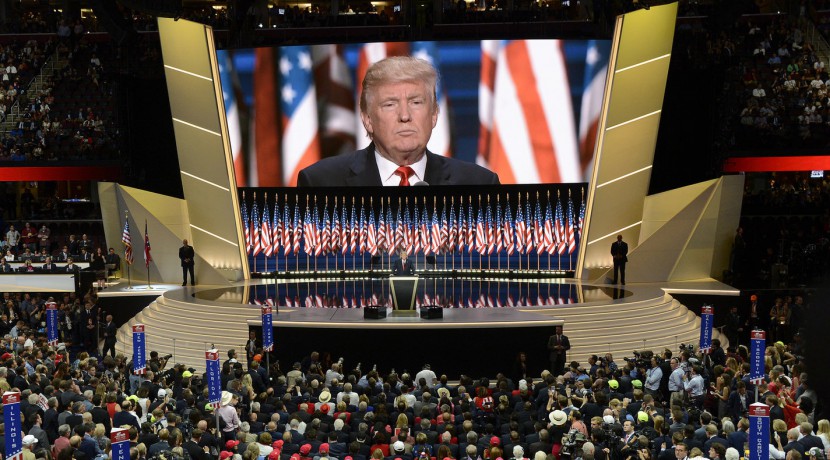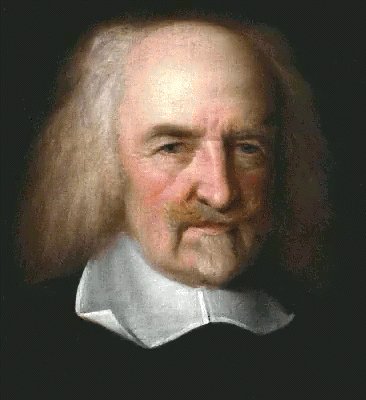Ever since I started this site, I’ve been finding Fear in some interesting places. I saw Disney’s Zootopia when it was in theaters last spring, and it occurred to me that the movie hit on my Hobbesian ideas on Fear. Now that it’s out on Netflix, I thought it would be a good time to put on the Hobbes-colored glasses and flesh out those ideas in a post.
Zootopia is a kid’s movie about a spunky bunny and a con-artist fox who stumble upon a massive conspiracy and help save the city of Zootopia. I think it is also an elaborate Hobbesian allegory. In the film, Judy Hopps, a small-town bunny, is the first bunny to become a police officer in Zootopia, an animal metropolis where “anyone can be anything.” Zootopia is the product of all mammals coming together and living peacefully in a community. There is clearly a social contract element to the film, so Fear in Philosophy head researcher Serge Engine and I tried to find out if the filmmakers had a social contract in mind when they made the movie. In this article, the directors mention both Fear in society and the social contract. I couldn’t dig up any interviews that mention Hobbes as a source of inspiration, but the use of Fear here makes him very apropos.
The central issue of the film tests the social contract of Zootopia. It also represents the divisions in our own society about race. Strange instances of some members of predator species “going savage” and attacking other animals is stirring up Fear in the city and causing discrimination against predators. The harmonious city is torn apart, and our protagonist Judy Hopps will play a crucial role in reuniting it. The bulk of this post will present a series of quotes from the film, presented chronologically, that illustrate the Hobbesian theme. The first two quotes are from the opening scene of the film, which takes the form a children’s play at a county fair-style event.
“Fear. treachery. bloodlust. Thousands of years ago, these were the forces that ruled our world.”
-Judy Hopps, narrating a play at a county fair
These are the very first words spoken in the film, and they set up a grim picture of ancient times for the animal kingdom. Throughout the movie, the story elaborates on the primitive old days before Zootopia, were prey lived in constant Fear of the predators. Zootopia didn’t exist, and animals were left to fend for themselves in an undeveloped world. Hobbes alert! This is the same description Hobbes gives for his State of Nature. Dominated by Fear, no society, no law. The filmmakers are letting it be known right off the bat that this is the lens that Zootopia will use in this story. It is the foundation of the animals Fears about predators which develop later in the plot.
“But over time we moved beyond our primitive, savage ways…. [We formed] the great city of Zootopia, where our ancestors first joined together and declared that ‘Anyone can be Anything!’”
-Judy Hopps, narrating the same play at the county fair
Eventually, the animals came to together to join in society, and the magnificent city of Zootopia was created. The city is a symbol of harmony in the animal world. It is the product what can be accomplished by overcoming dark natural tendencies and pursuing common goals.
Hobbes argues that will hate the State of Nature so much that we come together to form a Social Contract in which we transfer our rights to the Sovereign. Judy describes the progress of mammal-kind from the State of Nature to the formation of Zootopia, a gleaming monument to animal harmony. Judy says that there was an explicit coming together when animals agreed to live in society. The magnificent city of Zootopia was created when animals sought to seek peace with one another, which happens to be Hobbes’ First Law of Nature. The city is the product what can be accomplished by overcoming dark natural tendencies and pursuing common goals. Clearly, Zootopia functions because of a Social Contract in which animals have agreed not to harm other animals and to allow individual freedoms (hence the motto “Anyone can be Anything”), and to submit to the authority of government and the Zootopia Police Department (ZPD). All the animal citizens of Zootopia know how important it is for them to honor their social contract, which is why the conflict that develops in the film is so painful of the city.
Interestingly, Judy uses the word “savage” here, which is the same word Hobbes uses to describe people in the State of Nature. Here’s a quote from the famous Chapter 13 of the Leviathan, in which Hobbes explains his State of Nature:
“It may peradventure be thought there was never such a time nor condition of war as this; and I believe it was never generally so over all the world, but there are many places where they live so now. For the savage people in many places of America, except the government of small families the concord whereof dependeth on natural lust, have no government at all, and live at this day in that brutish manner as I said before.” Leviathan, Chapter 13
There is a racial element present here, of course. Hobbes was an Englishmen living at the dawn of colonialism, and he viewed American Indians as uncivilized and “savage.” In Zootopia, we are dealing with actual animals, so the word doesn’t need to carry those connotations. But it does speak to Judy’s opinion of life without the social contract, and it isn’t flattering. Clearly, Judy feels that Zootopia is superior to life in ancient times.
The plot unfolds as a buddy-cop mystery to find out why predators in Zootopia have suddenly begun to “go savage” (there’s that word again). Our protagonist, Officer Hopps and a sly fox named Nick Wilde (a con artist who tricked Judy earlier, but has now been outsmarted himself and must help Judy crack the case) are trying to find out who is behind the mysterious savage animals. The trail leads them to a limousine owned by Mr. Big, an imposing mafia character who turns out to be a tiny mouse modeled after Don Corleone from The Godfather.
“My darling, we may be evolved, but deep down we are still animals.”
-Mr. Big, responding to Judy’s question about why a particular otter had gone savage.
Judy is struggling for answers in this crucial case, and Mr. Big provides her with this ontology of the nature of animals. At the core of every animal, he says, there is an urge to prey on others, a dark impulse to eschew the order of society and let the primitive nature come out. Judy, in some ways, shares this sentiment, although on a more subconscious level. It is a challenge for Judy to recognize this in herself and then to overcome it. This statement seems to inform Judy’s actions later in the movie, when she tells the press that going savage may be a function of predators’ biology. It is a challenge for Judy to recognize this in herself and then to overcome it. As a kid’s movie, there’s a moral here. A key lesson of the entire film is that we shouldn’t judge people by attributes like skin color or social class. When Judy attributes behavior to biological makeup, she is committing the error that the movie is speaking out against, but Hobbes would agree with her that “savage” behavior is at the core of human beings.
The dark nature of human beings is a hallmark of Thomas Hobbes’ career. Hobbes is perhaps most famous as the foil to John Locke’s utopian State of Nature and positive outlook on human nature. Hobbes thought humans were motivated by primal desires borne out of self-preservation alone and aren’t concerned with being ‘good’ or ‘moral.’ That is why we need the Sovereign to hold us back, to limit our desires in order to allow humanity to progress and prosper.
Judy and Nick continue to hunt for answers in the case, and after a harrowing encounter with a savage jaguar who tells them to beware of “night howlers”, they follow a lead to an abandoned hospital which will likely provide some clues. The facility is guarded by wolves, apparently the night howlers they heard about. In a plot twist, they discover that all the animals who have gone savage are inside, and it appears that Mayor Lionheart is behind the whole secret operation. He is arrested, and Judy believes she has solved the case. The ZPD asks her to hold a press conference explaining the case. The follow exchange is from that press conference.
Reporter: “Why is this [going savage] happening?”
Judy: “We still don’t know. It may have something to do with biology. A biological component—you know—something in their DNA.”
At this point in the film, the press wants to know why the animals started going savage. After Judy delivers her answer—that predators appear genetically predisposed to savage actions—the press immediately goes into a panic, stirring up fears that more predators will go savage.
This is a great place to introduce the ideas of Charles Mills, a contemporary philosopher who writes about Critical Race Theory. I’ve mentioned Mills on this site before, because I think his ideas are so helpful in explaining bias and discrimination in society. His 1997 book The Racial Contract explores the same racial issues that Zootopia tackles. Mills takes the work of the Social Contract thinkers (Hobbes, Locke, Rousseau, and Kant) and sets out to find how race operates in each of their theories. For Hobbes, Mills says that a bias against non-white people is present in his account of the physical state of nature. Hobbes wrote during a time when Europe was “civilized” and the Americas were “savage,” and this worldview is evident in Hobbes. In fact, Hobbes explicitly says that people in the Americas were living in a literal State of Nature. Mills then takes this and argues that since we fear the State of Nature, and the State of Nature is present only in non-whites, over time we have come to fear non-whites. As the physical State of Nature disappeared in our world, society redirected its fear onto the people who were perceived to represent it. Mills calls this ‘norming.’ In Judy’s assessment of the biology of predators, she expresses this view. She believes predators are innately part of the State of Nature, and at her press conference she inadvertently confirms this association for others.
The plot advances significantly after this. Judy realizes her comments have done more harm than good, and she decides to quit the police force. She and Nick go their separate ways and Judy returns home to be a carrot farmer. But when she hears about a poisonous berry called a “night howler” that makes animals go savage, she realizes she had it wrong the whole time: predators aren’t genetically prone to go savage, someone had been infecting them intentionally. Judy races to Zootopia and finds Nick, and together they investigate this new lead and discover a dark twist: Deputy Mayor Bellweather was behind the string of savage animals! She was infecting predators to stir up Fear about their savage tendencies. In the climactic scene below, Bellweather reveals her sinister plan. The following is the dramatic peak of the entire movie.
Judy: “So that’s it? Prey fears Predator and you stay in power?”
Bellweather: “Pretty much.”
Judy: “It won’t work!”
Bellweather: “Fear always works!!”
Okay, if you weren’t buying my Zootopia-is-Hobbes theory, you have to now. “Fear always works!” is the essence of Hobbes’ philosophy. In Hobbes, the sovereign derives his power from the need to provide security for people. The State of Nature has no security, and therefore everyone must live in constant Fear. So really, providing security means limiting the object of our Fear. In Zootopia, the object of Fear is predators, and Bellweather is seeking to gain power through demonizing predators. She is exploiting Fear to legitimize her own power. In the real world, using Mills’ argument, the object of our Fear is minority populations who we associate with the State of Nature. In this year’s presidential campaign, immigrants and Muslims have been the people who end up being exploited by politics.
Bellweather knows that Fear is the way to power. She knows that pitting people against each other will dredge up the Fear that settles below the surface. She knows that when motivated by Fear, people will trade their individual freedoms for a sense of security. That is a dangerous thing, but the events of history seem to acknowledge the truth of it. The rise of Nazism in WWII Germany is an obvious and often cited example, but in the same era closer to home, President Roosevelt was given unprecedented 3rd and 4th terms. This, too, is an example of Fear allowing greater concentration of power. Americans feared that their way of life could come under attack, so they turned to a leader who made them feel secure, even if butted up against longstanding precedent and the American respect for the peaceful transfer of power.
President Roosevelt may feel like a counterintuitive example, but I think it shows that Fear really is operative in more places than it seems at the surface. Zootopia disguises the layer of Fear that sits below the surface by using cute animals and a funny script, but Fear is clearly a factor holding the social contract together, for better and for worse.




